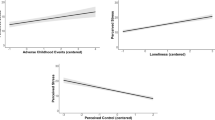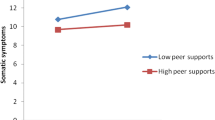Abstract
A growing body of research has shown that adolescent girls in the context of affluence face a series of unique pressures that may increase social-emotional problems. Little research, however, has examined associations between perceived stress and psychosomatic complaints among privileged youth. In the present study, we investigated the relationships between stress, psychosomatic complaints, and parental criticism in a sample of preadolescent and adolescent girls (n = 218) from selective, private schools. Using OLS regression analyses, cross-sectional and longitudinal associations were evident between perceived stress and psychosomatic complaints, with increases in stress associated with increases in psychosomatic problems. Parental criticism was also examined as a predictor of girls’ psychosomatic complaints and stress levels. Results indicated that parental criticism was significantly and positively associated with psychosomatic problems in cross-sectional models and that perceived stress levels mediated this association. Additional analyses demonstrated that the relationship between psychosomatic complaints and stress may be bidirectional. Taken together, results from this exploratory study suggest that girls in the context of affluence may also experience psychosomatic complaints, in addition to social-emotional problems.
Similar content being viewed by others
References
Armsden, G. C., & Greenberg, M. T. (1987). The inventory of parent and peer attachment: Individual differences and their relationship to psychological well-being in adolescence. Journal of Youth and Adolescence, 16(5), 427–454.
Arnett, J. J. (1999). Adolescent storm and stress, reconsidered. American Psychologist, 54(5), 317–326.
Baron, R. M., & Kenny, D. A. (1986). The moderator–mediator variable distinction in social psychological research: Conceptual, strategic, and statistical considerations. Journal of personality and Social Psychology, 51(6), 1173.
Blattner, M. C., Liang, B., Lund, T., & Spencer, R. (2013). Searching for a sense of purpose: The role of parents and effects on self-esteem among female adolescents. Journal of Adolescence, 36, 839–848.
Chen, E., Matthews, K. A., & Boyce, W. T. (2002). Socioeconomic differences in children’s health: How and why do these relationships change with age? Psychological Bulletin, 128(2), 295–329. https://doi.org/10.1037//0033-2909.128.2.295.
Ciciolla, L., Curlee, A., Karageorge, J., & Luthar, S. S. (2016). When mothers and fathers are seen as disproportionately valuing achievements: Implications for adjustment among upper middle class youth. Journal of Youth and Adolescence. https://doi.org/10.1007/s10964-016-0596-x.
Cohen, S., Kamarck, T., & Mermelstein, R. (1983). A global measure of perceived stress. Journal of Health and Social Behavior, 24, 385–396.
Cohen, S., Schwartz, J. E., Bromet, E. J., & Parkinson, D. J. (1991). Mental health, stress, and poor health behaviors in two samples. Preventive Medicine, 20, 306–315.
Coley, R. L., Sims, J., Dearing, E., & Spielvogel, B. (2017). Locating economic risks for adolescent mental and behavioral health: Poverty and affluence in families, neighborhoods, and schools. Child Development. https://doi.org/10.1111/cdev.12771.
Currie, C. (1998). Health behaviour in school-aged children. A WHO Cross-National Study. Research protocol for the 1997/1998 Survey. Edinburgh: Research Unit in Health and Behavioural Change, University of Edinburgh.
Frost, R. O., Marten, P., Lahart, C. M., & Rosenblate, R. (1990). The dimensions of perfectionism. Cognitive Therapy and Research, 156, 449–468.
Grant, K. E., Compas, B. E., Stuhlmacher, A. F., Thurm, A. E., McMahon, S. D., & Halpert, J. A. (2003). Stressors and child and adolescent psychopathology: Moving from markers to mechanisms of risk. Psychological Bulletin, 129(3), 447–466.
Grant, K. E., Compas, B. E., Thurm, A. E., McMahon, S. D., Gipson, P. Y., Campbell, A. J., & Westerholm, R. I. (2006). Stressors and child and adolescent psychopathology: Evidence of moderating and mediating effects. Clinical Psychology Review, 26, 257–283.
Ghandour, R. M., Overpeck, M. D., Huang, J. Z., Kogan, M. D., & Scheidt, P. C. (2004). Headache, stomachache, backache, and morning fatigue among adolescent girls in the United States. Archives of Pediatrics and Adolescent Medicine, 158, 797–803.
Hankin, B. L., & Abramson, L. Y. (2001). Development of gender differences in depression: An elaborated cognitive vulnerability-transactional stress theory. Psychological Bulletin, 127, 773–796.
Hinshaw, S. P., & Kranz, R. (2009). The triple bind: Saving our teenage girls from today's pressures. New York, NY: Ballantine.
Lazarus, R. S., & Folkman, S. (1984). Stress, appraisal, and coping. New York, NY: Springer.
Leonard, N. R., Gwadz, M. V., Ritchie, A., Linick, J. L., Cleland, C. M., Elliot, L., & Grethel, M. (2015). A multi-method exploratory study of stress, coping, and substance use among high school youth in private schools. Frontiers in Psychology, 6, 1–16.
Levine, M. (2006). The price of privilege: How parental pressure and material advantage are creating a generation of disconnected and unhappy kids. New York, NY: Harper.
Liang, B., Lund, T. J., Mousseau, A., White, A., Spencer, R., & Walsh, J. (2017). Adolescent girls finding purpose: The role of parents and pro-sociality. Youth & Society. https://doi.org/10.1177/0044118X17697850.
Lund, T. J., & Dearing, E. (2013). Is growing up affluent risky or is the problem growing up in an affluent neighborhood? Journal of Research on Adolescence, 23, 274–282. https://doi.org/10.1111/j.1532-7795.2012.00829.x.
Lund, T. J. Dearing, E., & Zachrisson, H. D. (2017). Is affluence a risk for adolescents in Norway? Journal of Research on Adolescence, 27(3), 628–643.
Luthar, S. S. (2003). The culture of affluence: Psychological costs of material wealth. Child Development, 74(6), 1581–1593.
Luthar, S. S., & Barkin, S. H. (2012). Are affluent youth truly “at risk”? Vulnerability and resilience across three diverse samples. Development and Psychopathology, 24(02), 429–449. https://doi.org/10.1017/S0954579412000089.
Luthar, S. S., Barkin, S. H., & Crossman, E. J. (2013). “I can, therefore I must”: Fragility in the upper-middle classes. Development and Psychopathology, 25th Anniversary Special Issue, 25, 1529–1549.
Luthar, S. S., & Becker, B. E. (2002). Privileged but pressured? A study of affluent youth. Child Development, 73(5), 1593–1610.
Luthar, S. S., & D’Avanzo, K. (1999). Contextual factors in substance use: A study of suburban and inner-city adolescents. Developmental and Psychopathology, 11, 845–867.
Luthar, S. S Goldstein, A. S. (2008). Substance use and related behaviors among suburban late adolescents: The importance of perceived parent containment. Development and Psychopathology, 20(2), 591–614. https://doi.org/10.1017/S0954579408000291.
Luthar, S. S., & Latendresse, S. J. (2005). Children of the affluent: Challenges to well-being. Current Directions in Psychological Science, 14(1), 49–53.
Luthar, S. S., Shoum, K. A., & Brown, P. J. (2006). Extracurricular involvement among affluent youth: A scapegoat for ‘ubiquitous achievement pressures’? Developmental Psychology, 42(3), 583.
Lyman, E. L., & Luthar, S. S. (2014). Further evidence on the “costs of privilege”: Perfectionism in high-achieving youth at socioeconomic extremes. Psychology in the Schools, 51(9), 913–930.
Mechanic, D. (1983). Adolescent health and illness behavior: Review of the literature and a new hypothesis for the study of stress. Journal of Human Stress, 9(2), 4–13.
Mousseau, A., Lund, T., Liang, B., Spencer, R., & Walsh, J. (2016). Stress and losing sleep: Sleep duration and perceived stress among affluent adolescent females. Peabody Journal of Education, 9(5), 628–644. http://dx.doi.org/10.1080/0161956X.2016. 1227186.
Myers, D. G.(2000). The funds, friends, and faith of happy people. American Psychologist, 55, 56–67.
Pearlin, L. I., Menaghan, E. G., Lieberman, M. A., & Mullan, J. T.(1981). The stress process. Journal of Health and Social Behavior, 22(4), 337–356.
Pearlin, L. I. (1989). The sociological study of stress. Journal of Health and Social Behavior, 30, 241–256.
Ravens-Sieberer, U., Erhart, M., Torsheim, T., & Gaspar de Matos, M. (2008). An international scores system for self-reported health complaints in adolescents. The European Journal of Public Health, 18(3), 294–299.
Rosin, H. (2015). The silicon valley suicides. The Atlantic. https://www.theatlantic.com/magazine/archive/2015/12/the-silicon-valley-suicides/413140/
Rudolph, K., & Hammen, C. (1999). Age and gender as determinants of stress exposure, generation, and reactivity in youngsters: A transactional perspective. Child Development, 70, 660–677.
Sontag, L. M., & Graber, J. A. (2010). Coping with perceived peer stress: Gender-specific and common pathways to symptoms of psychopathology. Developmental Psychology, 46(6), 1605–1620. https://doi.org/10.1037/a0020617.
Sontag, L. M., Graber, J. A., Brooks-Gunn, J., & Warren, M. P. (2008). Coping with social stress: Implications for psychopathology in young adolescent girls. Journal of Abnormal Child Psychology, 36(8), 1159–1174. https://doi.org/10.1007/s10802-008-9239-3.
Seiffge-Krenke, I. (2006). Coping with relationship stressors: The impact of different working models of attachment and links to adaptation. Journal of Youth and Adolescence, 35, 25–39.
Seiffge-Krenke, I. (2000). Causal links between stressful events, coping style, and adolescent symptomatology. Journal of Adolescence, 23(6), 675–691.
Spear, H., & Kulbok, P. (2001). Adolescent health behaviors and related factors: A review. Public Health Nursing, 18(2), 82–93.
Spencer, R., Walsh, J., Liang, B., Mousseau, A. M., & Lund, T. (2016). Having it all?: A qualitative examination of affluent adolescent females’ perceptions of stress and their quests for success. Journal of Adolescent Research, 33(1), 3–33.
Suldo, S. M., & Shaunessy-Dedrick, E. (2013). The psychosocial functioning of high school students in academically rigorous programs. Psychology in the Schools, 50(8), 823–843.
Suldo, S. M., Shaunessy, E., & Hardesty, R. (2008). Relationships among stress, coping, and mental health in high-achieving high school students. Psychology in the Schools, 45(4), 273–290.
Thoits, P. A. (1995). Stress, coping, and social support processes: Where are we? What next? Journal of Health and Social Behavior, 35, 53–79.
Thoits, P. A. (2010). Stress and health: Major findings and policy implications. Journal of Health and Social Behavior, 51(1 Suppl), S41–S53. https://doi.org/10.1177/0022146510383499.
Torhseim, T., & Wold, B. (2001). School-related stress, school support, and somatic complaints: A general population study. Journal of Adolescent Research, 16(3), 293–303.
Torsheim, T., Ravens-Sieberer, U., Hetland, J., Valimma, R., Danielson, M., & Overpeck, M. (2006). Cross-national variation of gender differences in adolescent subjective health in Europe and North America. Social Science & Medicine, 62(4), 815–827.
Yates, T. M., Tracy, A. J., & Luthar, S. S. (2008). Nonsuicidal self-injury among “privileged” youths: Longitudinal and cross-sectional approaches to developmental process. Journal of Consulting and Clinical Psychology, 76(1), 52–62. https://doi.org/10.1037/0022-006X.76.1.52.
Author Contributions
K.W. assisted with the data analyses and wrote the paper. T.J.L. collaborated with the design and execution of the 21st Century Athenas study, assisted with the data analyses, and wrote the paper. B.L. PI of the 21st Century Athenas study and collaborated with the writing and editing of the final manuscript. A.D.M. collaborated with the design and execution of the 21st Century Athenas study and collaborated with the writing and editing of the final manuscript. R.S. Co-PI of the 21st Century Athenas study and collaborated with the writing and editing of the final manuscript.
Funding
This study was conducted with the support and cooperation of Laurel School’s Center for Research on Girls. This study was also supported through Wingate University’s Summer Research Grant Program.
Author information
Authors and Affiliations
Corresponding author
Ethics declarations
Conflict of Interest
The authors declare that they have no conflict of interest.
Ethical Approval
All procedures performed in studies involving human subjects were in accordance with the ethical standards of the institution or practice at which the studies were conducted.
Informed Consent
Informed consent was obtained from all individual participants included in the study.
Rights and permissions
About this article
Cite this article
Williams, K., Lund, T.J., Liang, B. et al. Associations between Stress, Psychosomatic Complaints, and Parental Criticism among Affluent Adolescent Girls. J Child Fam Stud 27, 1384–1393 (2018). https://doi.org/10.1007/s10826-017-0991-2
Published:
Issue Date:
DOI: https://doi.org/10.1007/s10826-017-0991-2




